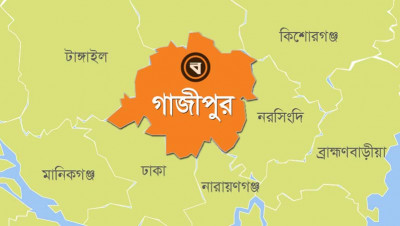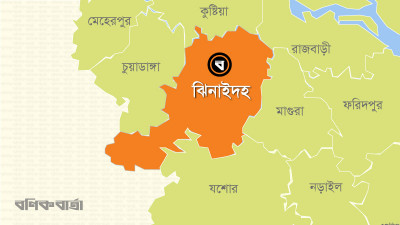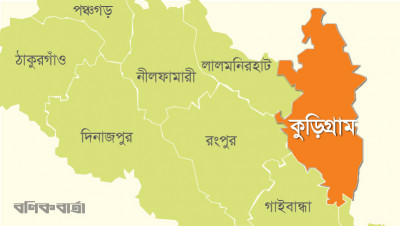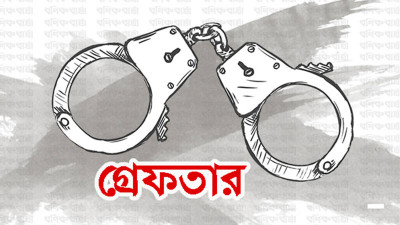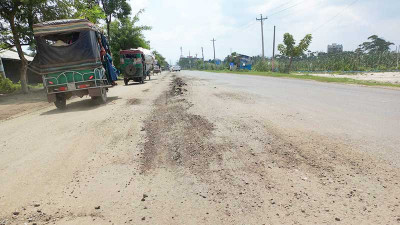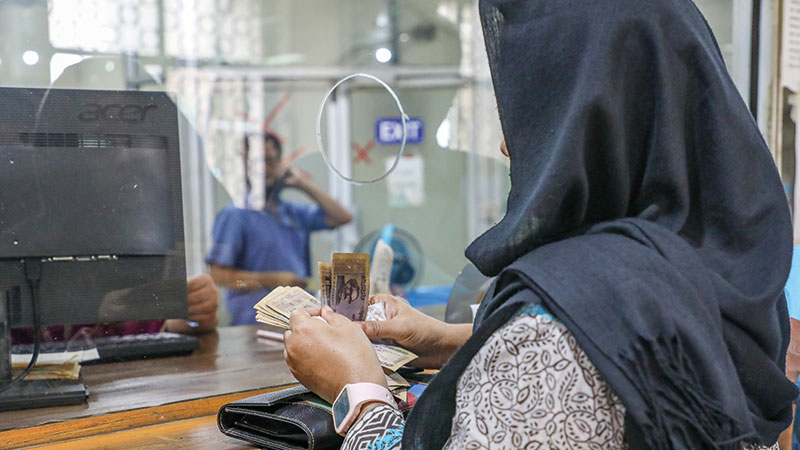 Photo : Bonik Barta
Photo : Bonik Barta The
demand for cash in the country's banking sector has intensified. Bangladesh
Bank (BB) continues to print new money to manage the situation. According to
central bank data, the amount of issued notes reached BDT 3.27 trillion as of
June 20. This is the highest amount of issued notes ever recorded in the
country. Of the issued notes, 95 percent have left the banking sector.
The
situation has worsened further in the current month, with the demand for cash
increasing without any specific reason. The recent violence regarding the quota
movement has intensified the general public's trust in the banking sector. This
sudden surge in cash demand and the subsequent shortage could have significant
implications for the economy.
Last
week, the country experienced conflict, casualties, internet shutdowns, and
curfews related to the quota reform movement. As a result, all official
financial transactions, including banks, were closed for five consecutive days.
Most ATM booths were also closed due to a lack of cash. Despite having money in
banks, there was a nationwide cash shortage. On Wednesday, long queues formed
at bank branches as people tried to withdraw cash. To manage the situation, at
least 30 commercial banks borrowed BDT 255.21 billion from the Bangladesh Bank
that day. The borrowed funds were used to meet customer needs and to maintain
cash reserve ratios (CRR) and statutory liquidity ratios (SLR) with the central
bank.
Sources
indicate that on Wednesday, many banks in the country did not have the capacity
to meet customer demand for cash. This is why such a large amount of money had
to be borrowed from the central bank. On Thursday, the central bank also lent
more than BDT 200 billion. Daily transactions for over two dozen banks in the
country are now entirely reliant on loans from the central bank.
Zafar
Alam, Managing Director (MD) of Social Islami Bank, said to Bonik Barta,
"For five consecutive days, people could not conduct financial transactions.
As a result, there was increased pressure for cash withdrawals on Wednesday and
Thursday. During this period, some money was deposited as well. We managed to
meet customer demands within our capacity. However, the trend of remittances
coming in was somewhat lower during these two days."
Syed
Mahbubur Rahman, MD of Mutual Trust Bank, provided similar information. He
said, "Due to high inflation and some incidents, people's tendency to hold
onto cash has increased. Consequently, the amount of notes issued by the
central bank has risen. Despite the pressure for cash withdrawals over the past
two days, our bank's deposits were quite healthy. If the flow of remittances
returns to normal, liquidity in banks will improve. We hope the situation will
fully be normalized within two to four days."
For
the past two fiscal years, the Bangladesh Bank has set controlling inflation as
its primary goal in monetary policy announcements. To manage the flow of money
in the market, the policy interest rate (repo rate) has been increased, raising
it to 8.5 percent after several hikes. The cap on bank loan interest rates was
also removed, previously set at 9 percent. Consequently, bank loan interest
rates have steadily risen to 15-16 percent. Meanwhile, private sector loan flow
is now relatively stagnant. Imports have been reduced by 15.5 percent, and
there has been a decline in both industrial production and market demand for
goods. Despite this situation, the central bank continues to increase the
amount of issued notes.
A
review of Bangladesh Bank data shows that by the end of December, the central
bank's issued notes stood at BDT 2.77 trillion. By January of this year, the
amount of cash notes increased to BDT 2.8 trillion. It further rose to over BDT
2.82 trillion in February. By March, the issued notes reached BDT 2.91189
trillion, and in April, it climbed to BDT 3.05198 trillion. As of June 20, the
number of issued notes exceeded BDT 3.27 trillion.
Economists
say the increased number of notes issued is due to the public's lack of trust
in the banking sector. The central bank is issuing notes, but these notes are
leaving the banks. With such a large amount of cash outside the banks,
controlling inflation will never be possible.
Dr.
Salehuddin Ahmed, former Governor of Bangladesh Bank thinks, "The
government talks about building a 'Smart Bangladesh' after digitalization, yet
internet access has been shut down in the country for the past week. People
still cannot conduct app-based transactions. This way, creating a 'cashless'
economy is not possible."
Dr.
Salehuddin Ahmed told Bonik Barta, "Many banks are operating daily
transactions by borrowing from the central bank. Some banks are even being
supplied with new money. These factors will further exacerbate inflation in the
country. People will become more aside to banks, and foreign investment will be
hindered. Foreigners see that the government can shut down the internet or halt
banking transactions. Why would foreign investment come to a country with such
instability? To improve the situation, the government must first address its
issues."
The
country's banking sector has been facing a liquidity crisis for nearly two
years. According to Bangladesh Bank sources, at least a dozen banks are
experiencing a severe cash shortage. The central bank has been assisting some
banks by printing new money. Some of these banks have a loan-to-deposit ratio
(ADR) exceeding 100 percent. Before Eid-ul-Azha, the central bank provided
daily BDT 15-20 billion loans. However, after Eid, the amount of borrowing
gradually decreased. On July 11, some banks borrowed only BDT 6.8 billion from
the central bank. By July 16, this amount had increased to BDT 9.99 billion. On
July 18, following nationwide clashes related to the quota reform movement, the
borrowing amount rose to BDT 16.768 billion. Banks were closed for five
consecutive days from Friday to Tuesday, with all formal financial transaction
channels, including the internet, shut down. Banking services resumed on a
limited basis from Wednesday, with banks open from 11 am to 3 pm. On Wednesday
and Thursday, banks operated with half of their branches open. On July 24, at
least 30 banks borrowed BDT 25.521 billion from the central bank. On Thursday,
they borrowed more than BDT 20 billion. These funds were provided through Repo,
Assured Repo, Assured Liquidity Support (ALS), and Islamic Banks Liquidity
Facility (IBLF) for Shariah-based banks.

